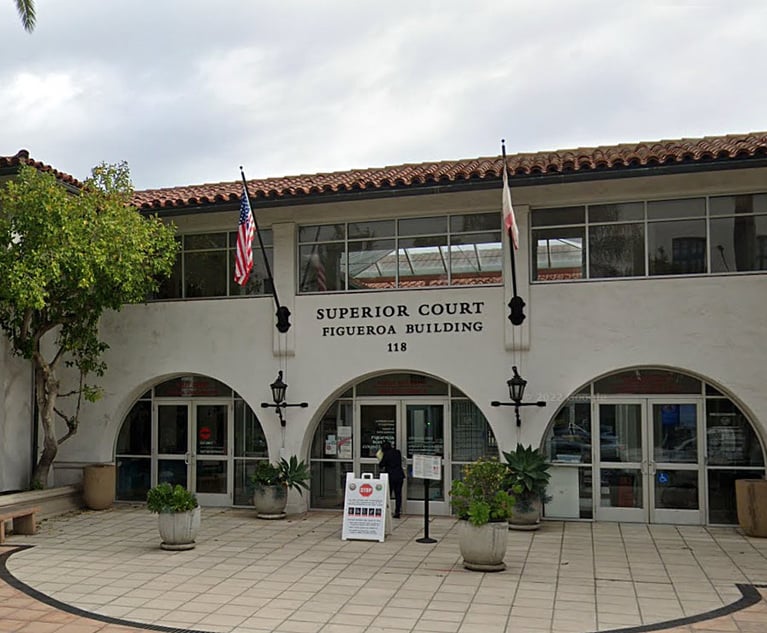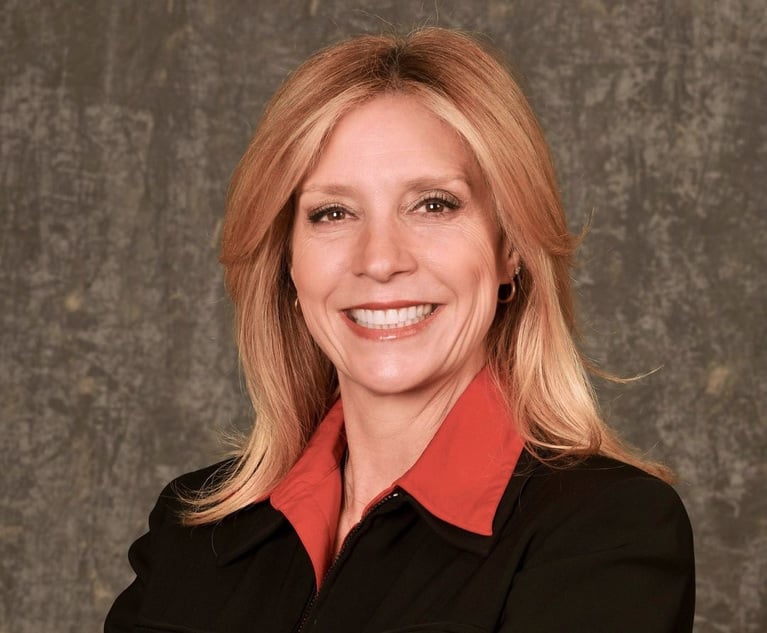Catching Up With UCLA's Jennifer Mnookin on Bar Exam's Future and Virus-Era Challenges for New Grads
"I do believe that the state supreme courts and the state bars across this country are trying their best to address an unprecedented set of circumstances. But at the same time, I'm not sure they're fully recognizing how stressful these forms of uncertainty are for young lawyers," UCLA law dean Jennifer Mnookin says.
June 05, 2020 at 04:23 PM
6 minute read
 Jennifer Mnookin of UCLA.
Jennifer Mnookin of UCLA.UCLA School of Law dean Jennifer Mnookin said goodbye to 315 J.D. graduates in a virtual commencement ceremony honoring the Class of 2020 on May 15.
"Do not bemoan your fate," she said in a streaming video from the school's library. "Ask instead how you can improve the lives of those who are suffering through this health and economic emergency. Ask how you can help to address long-standing issues of inequality, injustice and unfairness that this pandemic has helped to make even more apparent."
A few days later, and a week before the death of George Floyd in Minneapolis roiled the nation, Mnookin spoke with The Recorder about the uncertainties her graduates face in the pandemic, her unsuccessful lobbying for a provisional licensing program in California and the fate of the state's controversial bar exam.
The excerpts of that conversation below were edited for length and clarity.
The Recorder: Why do you think the idea of provisional licensing didn't catch on widely?
Mnookin: It's clear that an enormous number of states are wanting to do everything in their power to try to give the bar exam, at least by September. We just don't know about the genuine feasibility of that.
It's been surprising to me, and a little disappointing, that more states haven't recognized that making commitments now about robust provisional licensing would be a valuable way to take a little bit of pressure off our students, their employers and frankly, themselves.
These states that are talking about trying to do remote exams and online exams—I'm concerned about whether that's going to prove feasible and truly technologically workable at the scale that is required. If it is, it's a terrific alternative. And if it's truly feasible, it could be a terrific alternative well after the COVID-19 issues are a memory.
The challenge it's leaving our graduates with is just really substantial. They have a lot of uncertainty. They don't know if it's going to be given. They don't know whether these dates are for real or if it's going to be given in person but with limited capacity. They don't know if they're going to be able to get a seat. There's obviously all this controversy and concern around states giving preference to graduates of their law schools.
Is there the capacity in the legal world right now to handle the supervision provisional licensing would require?
I think there is. The biggest challenge, of course, would have been for anyone wanting to go out and hang up their shingle. Provisional licensing would not make that feasible.
But it seems to me that in most other settings—public interest, government and private sector—lawyers who are working with other lawyers are already getting some other reasonable degree of supervision if everybody's doing their jobs right. And so I'm not sure that a great deal of additional supervision would be necessary to ensure that the public is adequately protected.
As to the issue of the bar exam itself, where do you feel things stand? The bar has said it's working with the Supreme Court on a blue-ribbon commission to consider the future of the test.
My view on this, which I've said in a number of places, is that California's atypically high cut score is very difficult to defend. I think there's virtually no evidence that it makes for better lawyers or protects the public.
This task force, I'm pleased to see the bar and the court ready to engage in this set of questions more holistically. I think that's a very positive step. I was also intrigued and pleased to see that the [Uniform Bar Exam] is part of that conversation.
If California wants to remain committed to its atypically high cut score, becoming part of the UBE would at least mean that graduates that didn't meet California's standards have the opportunity to go practice elsewhere, if that's what they prefer.
The combo of being on your own, not being part of the UBE, with no other waive-in provisions and an atypically high cut score, I don't think it benefits our state. And it certainly doesn't benefit the graduates of our state's law schools.
Do you think the studies the bar has conducted about the exam and the practice of law will provide the "aha!" moment for policymakers to change their minds about the test and its high cut score?
Unfortunately, I think these studies are unlikely to give any really clear answers. These are really policy questions, and we need policy-driven answers. The data itself is not going to tell us where to go or what we need to do.
We need to think holistically about the purposes of the bar, about the need to protect the public, about the need to have a fair method of examination, about the question of whether California is distinctive compared to other states. Are there truly differences about what California bar-takers need to know or how well they have to do that are very different from places like New York, Texas, Pennsylvania and Illinois? If so, what are they? What's different about us?
Your graduates are probably going to do well on whatever exam is put in front of them. But how are they handling the challenges in front of them right now?
They're under a good deal of understandable stress about the many uncertainties that face them as they launch their careers. They don't know if they're going to be able to take the bar in September or July, depending on where.
They're facing a job market that looks quite a bit different than what they expected a few months ago. So even if they have employment lined up, many of those employers are under significant stress.
So they're really facing a set of painful and unfortunate challenges. Now, they're very talented. They're resilient. They will find a way.
I do believe that the state supreme courts and the state bars across this country are trying their best to address an unprecedented set of circumstances. But at the same time, I'm not sure they're fully recognizing how stressful these forms of uncertainty are for young lawyers eager to launch their careers and eager to begin to make a difference in a world where COVID is raising an enormous number of legal questions and where there are a tremendous number of people who need legal assistance.
This content has been archived. It is available through our partners, LexisNexis® and Bloomberg Law.
To view this content, please continue to their sites.
Not a Lexis Subscriber?
Subscribe Now
Not a Bloomberg Law Subscriber?
Subscribe Now
NOT FOR REPRINT
© 2025 ALM Global, LLC, All Rights Reserved. Request academic re-use from www.copyright.com. All other uses, submit a request to [email protected]. For more information visit Asset & Logo Licensing.
You Might Like
View All


Santa Barbara Judge Accused of Moonlighting as Attorney for Secretary/Girlfriend
4 minute readTrending Stories
- 1Data Breach Lawsuit Against Byte Federal Among 1,500 Targeting Companies in 2024
- 2Counterfeiters Ride Surge in Tabletop Games’ Popularity, Challenging IP Owners to Keep Up
- 3Health Care Data Breach Class Actions Saw December Surge in NY Courts
- 4Florida Supreme Court Disbars 3, Suspends 11, Reprimands 1 in Final Disciplinary Order of 2024
- 5Chief Justice Roberts Ends Year With Defense Against 'Illegitimate' Attacks on Judiciary
Who Got The Work
Michael G. Bongiorno, Andrew Scott Dulberg and Elizabeth E. Driscoll from Wilmer Cutler Pickering Hale and Dorr have stepped in to represent Symbotic Inc., an A.I.-enabled technology platform that focuses on increasing supply chain efficiency, and other defendants in a pending shareholder derivative lawsuit. The case, filed Oct. 2 in Massachusetts District Court by the Brown Law Firm on behalf of Stephen Austen, accuses certain officers and directors of misleading investors in regard to Symbotic's potential for margin growth by failing to disclose that the company was not equipped to timely deploy its systems or manage expenses through project delays. The case, assigned to U.S. District Judge Nathaniel M. Gorton, is 1:24-cv-12522, Austen v. Cohen et al.
Who Got The Work
Edmund Polubinski and Marie Killmond of Davis Polk & Wardwell have entered appearances for data platform software development company MongoDB and other defendants in a pending shareholder derivative lawsuit. The action, filed Oct. 7 in New York Southern District Court by the Brown Law Firm, accuses the company's directors and/or officers of falsely expressing confidence in the company’s restructuring of its sales incentive plan and downplaying the severity of decreases in its upfront commitments. The case is 1:24-cv-07594, Roy v. Ittycheria et al.
Who Got The Work
Amy O. Bruchs and Kurt F. Ellison of Michael Best & Friedrich have entered appearances for Epic Systems Corp. in a pending employment discrimination lawsuit. The suit was filed Sept. 7 in Wisconsin Western District Court by Levine Eisberner LLC and Siri & Glimstad on behalf of a project manager who claims that he was wrongfully terminated after applying for a religious exemption to the defendant's COVID-19 vaccine mandate. The case, assigned to U.S. Magistrate Judge Anita Marie Boor, is 3:24-cv-00630, Secker, Nathan v. Epic Systems Corporation.
Who Got The Work
David X. Sullivan, Thomas J. Finn and Gregory A. Hall from McCarter & English have entered appearances for Sunrun Installation Services in a pending civil rights lawsuit. The complaint was filed Sept. 4 in Connecticut District Court by attorney Robert M. Berke on behalf of former employee George Edward Steins, who was arrested and charged with employing an unregistered home improvement salesperson. The complaint alleges that had Sunrun informed the Connecticut Department of Consumer Protection that the plaintiff's employment had ended in 2017 and that he no longer held Sunrun's home improvement contractor license, he would not have been hit with charges, which were dismissed in May 2024. The case, assigned to U.S. District Judge Jeffrey A. Meyer, is 3:24-cv-01423, Steins v. Sunrun, Inc. et al.
Who Got The Work
Greenberg Traurig shareholder Joshua L. Raskin has entered an appearance for boohoo.com UK Ltd. in a pending patent infringement lawsuit. The suit, filed Sept. 3 in Texas Eastern District Court by Rozier Hardt McDonough on behalf of Alto Dynamics, asserts five patents related to an online shopping platform. The case, assigned to U.S. District Judge Rodney Gilstrap, is 2:24-cv-00719, Alto Dynamics, LLC v. boohoo.com UK Limited.
Featured Firms
Law Offices of Gary Martin Hays & Associates, P.C.
(470) 294-1674
Law Offices of Mark E. Salomone
(857) 444-6468
Smith & Hassler
(713) 739-1250







